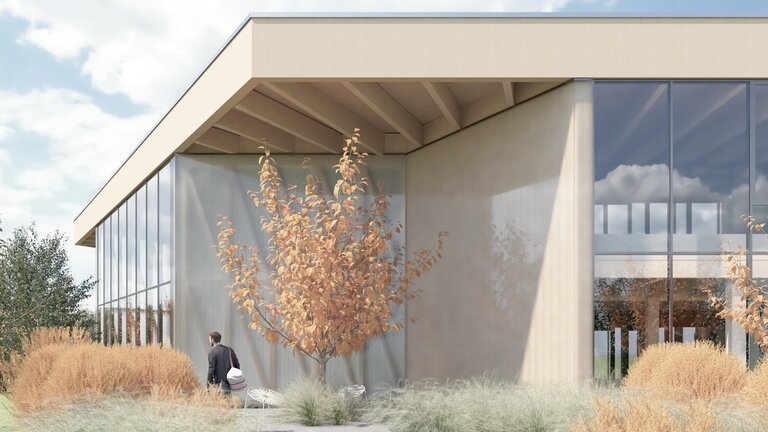Ditzingen, Germany, December 2, 2022. Machines controlled by a tablet, procedural instructions delivered from the cloud, whole production plants monitored with an app – networked production has long been part of the normal working day for the employees of the laser specialist Trumpf SE + Co. KG. Highly qualified staff members for these sophisticated tasks will still be needed in the future, so Trumpf is creating ideal conditions for apprenticeships and further vocational training. For example, the high-tech company is investing about 14.5 million euros in a new environment-friendly education center – with an integrated smart factory. Drees & Sommer SE, a company that specializes in construction and real estate consulting, is supporting Trumpf in this ambitious construction project, which celebrated its topping-out yesterday.
This September, more apprentices than ever before started their apprenticeship or their dual course of study with the Ditzingen-headquartered Trumpf company. For most of them, direct IT content is essential, or even the main focus of their training. In addition to apprenticeships in digital networking, Trumpf also offers specialist training in areas such as cyber-security. ‘We provide apprenticeships in 17 career professions, with a special focus on apprenticeships and courses of study in digital topics. In future, our trainees can even learn to apply key technologies in a proprietary smart factory.
To ensure that we satisfy the needs of our apprentices and dual students, we integrated their input into the planning of our smart education center and developed the concept together with them,’ explains Marco Klein, Head of Corporate HR Learning and Growth at Trumpf.
In addition to the smart factory, the new education center also contains workshops, creative and collaboration areas, modern seminar rooms and a large event area for up to 400 persons. The design by the Berlin-based architectural office Barkow Leibinger provides a functional and yet sustainable timber structure. ‘As part of the extension of our capacity in the location, our modern training and education center must meet all digital requirements, but the ecological framework is equally important, and the building must be sustainable,’ says Marco Klein.
Industrial Prefabrication Makes Construction Faster – and Using Regenerative Raw Materials Is Good for the Climate
‘Wood has a long tradition as a building material – and it has a great future in construction because of its ecological character. Wood has excellent thermal, structural and weather-resistant properties. As a regenerative raw material which stores CO2, locally grown timber without long transport routes is an environment-friendly building material,’ explains Drees & Sommer’s Project Lead Turan Cinkilic. Another advantage is that timber is easy to prefabricate, which makes it an ideal material for modular construction. Industrial prefabrication not only provides significant savings of time and cost in planning, production and assembly. Carrying out more and more working steps in advance in the factory makes work easier for the assembly staff on the building sites. Prefabrication also improves the quality of the components because the individual modules can be accurately produced to the nearest millimeter.
In the Right Place at the Right Time
A comparatively short construction period of 14 months must be achieved in spite of material shortages and disrupted supply chains. This means that all processes must be finely interlinked on the Trumpf building site. ‘Without perfect coordination between all parties involved, such a complex project can easily become a nightmare,’ comments Turan Cinkilic. Therefore, the construction manager uses the lean construction management method to ensure a structured planning process. ‘Lean construction basically means that all processes must be perfected to ensure that work packages are carried out simultaneously rather than successively wherever this is possible, and that any problems are identified at an early stage.
Therefore, we met with all trades to compile a detailed project sequence plan before construction work began. We have a digital planning board system that is our control instrument, and this system can also be used as a visual early warning system.’ This plan specifies the exact schedule for every single day, so it always shows exactly how many employees and what materials and machines are required at all times. The digital planning board can also analyze certain key data such as how well specific contractors meet their deadlines, the quality achieved each day and the use of bottleneck resources, and this also enables any necessary corrective measures to be taken. At the same time, the system is flexible enough to cushion any unforeseen developments and integrate any necessary short-term changes.
Only the structural building shell of the new education center can be seen at present. But the installation and fit-out work has already begun in the interior. The smart learning factory is due to begin operations in April. The lean method used on the building site will then be applied to the educational production process.
